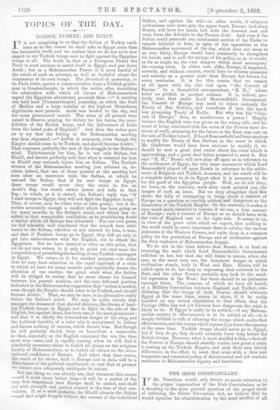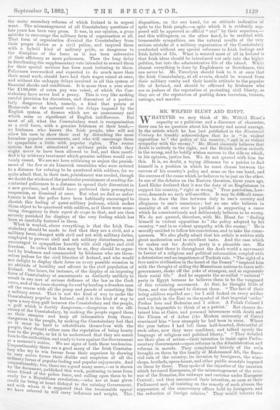THE IRISH CONSTABULARY.
Tr Mr. Trevelyan would only devote as much attention to the proper organisation of the Irish Constabulary as he is devoting to the more general question of the proper mode of enforcing the Crime Prevention Act, we believe that he would signalise his administration by the most needful of all
the many secondary reforms of which Ireland is in urgent want. The mismanagement of all Constabulary questions of late years has been very gross. It was, in our opinion, a gross mistake to encourage the military form of organisation at all. That form of organisation diverted the Constabulary from their proper duties as a civil police, and inspired them with a hybrid kind of military pride, as dangerous to the discipline of the force as it has been subversive of their efficiency as mere policemen. Then the long delay in distributing the supplementary vote intended to reward them for their special services has been most irritating to them. Policemen overworked and expected to do much more than their usual work, should have had their wages raised at once, and without the unhappy delays involved in all this system of financial checks and conditions. It is more than a year since the £180,000 of extra pay was voted, of which the Con- stabulary have never had a penny. This is very like making careful provision for discontent, and discontent of a particu- larly dangerous kind, namely, a kind that points at Home-rule as the natural cure for delays imposed by the English system of finance which are so unnecessary and which seem so significant of English indifference. But most of all, what the Constabulary want is reorganisation as a civil force, with a genuine Irishman at their head,— an Irishman who knows the Irish people, who will not allow his men to show their zeal by disturbing the most harmless popular amusements, and who will encourage them to sympathise a little with popular rights. The recent system has first stimulated a military pride which they -ought never to have been allowed to feel, and then morti- fied it by arbitrary treatment which genuine soldiers would cer- tainly resent. We are not here criticising as unjust the punish- ment of the five or six Limerick constables who were ordered to a distance for refusing to be quartered with soldiers, for we quite admit that, in their case, punishment was needed, though we doubt the wisdom of the particular punishment of sending dis- contented policemen to a distance to spread their discontent in a new province, and should have preferred their peremptory suspension, or dismissal at once. But what we find so unfor- tunate is that the police have been habitually encouraged to cherish this feeling of quasi-military jealousy, which makes them object to be quartered with soldiers, as if there were some- thing derogatory to their esprit de corps in that, and are then severely punished for displays of the very feeling which has been so carefully fostered in them. What is wanted, above everything, is that the Irish Con- stabulary should be made to feel that they are a civil, not a 'military force, charged with civil and not with military duties, employed to prevent civil and not military disturbances, and encouraged to sympathise heartily with civil rights and civil freedom. In order that this may be so, they should be organ- ised by Irishmen and commanded by Irishmen who are them- selves jealous for the civil liberties of Ireland, and who would ziot delight to display their force on every possible occasion in an attitude of hostility and affront to the civil population of Ireland. One hears, for instance, of the display of an imposing force of Constabulary at amusements as distinctly unlikely to result in any sort of serious defiance of the law as the Cork races, and of the force showing its zeal by hauling a drunken man off the course with all the pomp and parade of something like a military arrest. That is not the kind of way to make the 'Constabulary popular in Ireland, and it is the kind of way to open a very deep gulf between the Constabulary and the people, a gulf which is doubly dangerous,—dangerous to the effi- ciency of the Constabulary, by making the people regard them as their enemies and keep all information from them ; dangerous to the people, by making the Constabulary feel that as it must be hard to rehabilitate themselves with the people, they should either earn the reputation of being hearty 'foes to the people, or let it be understood that they are secret foes to the authorities, and ready to turn against the Government at a moment's notice. We see signs of both these tendencies. Unquestionably there are a good many of the Irish Constabu- lary who try to win favour from their superiors by showing in very active forms their dislike and suspicion of all the ordinary forms of popular feeling and popular enjoyments. And unquestionably, too, there are a good many more,—as is shown by the d ocu men t i
, published this week, professing to issue from
some friend of the police force, and calling upon them to be ready for a Republ' - man revolution,—who are at least given credit for being at heart disloyal to the existing Government, andwi '
th whom it is supposed
t at the treasonable appeal we have referred to 3° h will carry influence and weight. This disposition, on the one hand, for an attitude indicative of spite to the Irish people,—a spite which it is evidently sup- posed will be approved as official " zeal" by their superiors,— and this willingness, on the other hand, to be credited with treasonable sympathies, are the natural results of the very serious mistake of a military organisation of the Constabulary conducted without any special reference to Irish feelings and Irish habits of life. What is wanted most of all in Ireland is that Irish ideas should he introduced not only into the higher politics, but into the administrative life of the island. While almost everything is done by Englishmen or Scotchmen, this can never be. Mr. Trevelyan should look to it at once that the Irish Constabulary, at all events, should be weaned from their military vanity and their hostile attitude to the popular life of Ireland, and should be officered by Irishmen who are as jealous of the reputation of protecting civil liberty, as they are of the reputation of putting down terrorism, treason, outrage, and murder.































 Previous page
Previous page